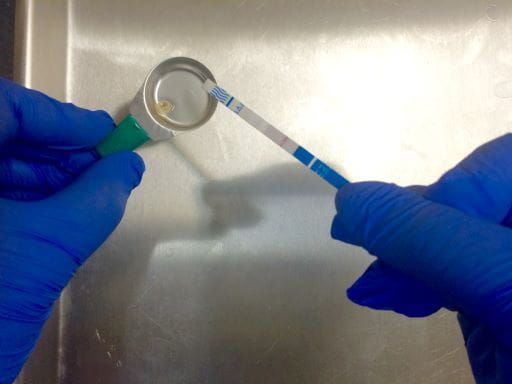Released on August 3, 2021
The Government of Saskatchewan is investing in harm reduction initiatives by providing access to fentanyl and benzodiazepine (benzo) test strips. These strips can detect the presence of fentanyl and benzo in street drugs - substances that are linked to increased overdose deaths in Saskatchewan.
Fentanyl is 50-100 times more toxic than other opioids. Of 73 confirmed drug toxicity deaths in Saskatchewan in 2021, 48 (66%) involved fentanyl. People who use drugs often do not know if fentanyl is present. It cannot be seen, smelled or tasted.
"We have seen the devastating impact that fentanyl has had on so many Saskatchewan families and communities," Mental Health and Addictions Minister Everett Hindley said. "Providing access to these test strips is one of the many harm reduction strategies our government is using to expand addictions services and reverse the rising number of overdose deaths in our province."
Test strips are now available to clients accessing the overdose prevention services at Nēwo Yōtina Friendship Centre in Regina and at Prairie Harm Reduction in Saskatoon. At both locations, staff members have received training on the proper use of test strips.
"Prairie Harm Reduction is excited to be able to offer this service as part of the Saskatchewan Ministry of Health's coordinated efforts to combat the overdose crisis," Executive Director of Prairie Harm Reduction in Saskatoon Jason Mercredi said. "Drug testing allows us to notify the community in real time of tainted street drugs."
"Adding drug testing, with the support of the Saskatchewan Ministry of Health, will further enhance our ability to reduce harm in our community," Executive Director of Nēwo Yōtina Friendship Centre in Regina Michael Parker said.
A negative result on a test strip does not guarantee the substance is safe. Test strips only check if fentanyl or benzo are present in the portion of the drugs tested. They do not detect other drugs and do not tell you the amount of fentanyl or benzo present in the substance. These strips are an additional tool to limit potential overdoses.

The Ministry of Health asks all those using street drugs to not use alone. Go to an overdose prevention or supervised consumption site, use the buddy system or call the National Overdose Response Service (1-888-688-6677). Naloxone kits to reverse opioid overdoses are available throughout the province. Visit www.saskatchewan.ca/opioids for more information.
In the event of an overdose, call 911. Under the Good Samaritan Act, you will not be charged for possession of an illegal substance if you are calling for assistance during an overdose.
The Ministry of Health is investing a record $458 million for mental health and addictions services in 2021-22, an increase of $23.4 million over last year's budget. Of that investment, $2.6 million is specifically for harm reduction initiatives across the province, an increase of $1.4 million from last year. Test strips for drug checking is one of several new harm reduction initiatives funded this year.
-30-
For more information, contact:
Health
Regina
Phone: 306-787-4083
Email: media@health.gov.sk.ca

